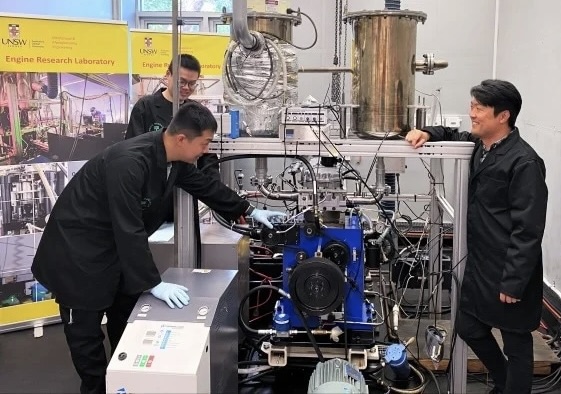Finding alternatives to conventional fuels such as gasoline is a major way to reduce emissions and air pollution and help combat global warming. In the current context of the climate emergency, alternative fuels are becoming increasingly popular because of both the green effect and sustainability factor, which gives a greater chance of success when it comes to achieving current climate goals.
 Image Credit: Prof. Shawn Kook, UNSW
Image Credit: Prof. Shawn Kook, UNSW
Research engineers in the School of Mechanical Engineering at the University of New South Wales, Sydney, have managed to successfully convert a conventional diesel engine to a hybrid hydrogen-diesel engine with the potential to reduce CO2 emissions by at least 85%.
The team states that their concept of retro-converting traditional diesel engines into a novel hybridized engine could be applied to existing vehicles and equipment in the agricultural, mining, and transportation industries.
"This new technology significantly reduces CO2 emissions from existing diesel engines, so it could play a big part in making our carbon footprint much smaller, especially in Australia with all our mining, agriculture and other heavy industries where diesel engines are widely used."
Professor Shawn Kook, Lead Author
Hydrogen-Diesel Dual Fuel Hybrid
While the emphasis is typically placed on developing completely new technologies to tackle the climate crisis and address global warming, bringing new technology to fruition can be a long, drawn-out process. Therefore, looking at ways to modify existing machinery and engines that use conventional fuel sources could offer an intermediate solution to deal with the current situation.
The team’s work, published in the Journal of Hydrogen Energy, describes how, with the novel engine, they were able to achieve up to 90% hydrogen energy fraction by converting a standard diesel engine into a hydrogen-diesel dual fuel hybrid.
"We have shown that we can take those existing diesel engines and convert them into cleaner engines that burn hydrogen fuel."
Professor Shawn Kook, Lead Author
To achieve such promising results, the process of developing the novel engine involves the preservation of the diesel engine's original injection system while adding a direct hydrogen fuel injection into the cylinder.
By controlling the timing of the direct hydrogen injection, the mixture condition is carefully regulated, meaning that any harmful nitrogen oxide emissions are resolved. Nitrogen oxide has been one of the main barriers holding back the large-scale commercial production of hydrogen engines.
"If you just put hydrogen into the engine and let it all mix together you will get a lot of nitrogen oxide (NOx) emissions, which is a significant cause of air pollution and acid rain. But we have shown in our system if you make it stratified – that is, in some areas, there is more hydrogen, and in others, there is less hydrogen – then we can reduce the NOX emissions below that of a purely diesel engine."
Professor Shawn Kook, Lead Author
Improving Efficiency and Reducing Environmental Impact
Typically, hydrogen fuel engines and machinery tend to require ultra-pure hydrogen, limiting its application due to cost concerns. However, the engineers at UNSW explain that their hybrid system does not require extremely high-purity hydrogen, which tends to be rather expensive. Thus, aside from being more environmentally friendly, the researcher's hybrid offering is also potentially more cost-effective.
Furthermore, the team found that their novel engine was able to yield an improvement in efficiency by around 26% compared to conventional diesel engines. The improvements in efficiency are a result of careful, independent control of both the direct hydrogen injection timing, as well as diesel injection timing. This facilitates tight regulation of the premixed and mixing-controlled combustion modes.
In the next two years, the team is hopeful that they can take their hybridized system to a commercial scale. Potential applications in the near future are likely to be focused on using the new hydrogen-diesel dual-fuel hybrid engines in locations where hydrogen pipelines are already installed.
“At mining sites, where hydrogen is piped in, we can convert the existing diesel engines that are used to generate power,” Kook says.
It is projected that around 30% of greenhouse-gas emissions are currently being produced by engines and equipment at mining sites. Therefore, improving the environmental impact of existing conventional systems through an effective conversion process would address immediate environmental concerns in this area.
